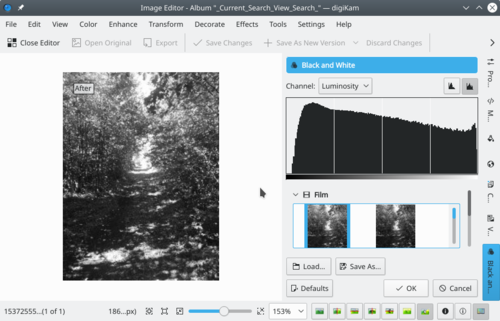Digikam/Blanco y negro
Convertir fotografías a blanco y negro con digiKam
Transcripción del blog de Dmitri Popov, 11 Febrero 2011.
If you fancy black and white photography, you’ll be pleased to learn that digiKam features a rather powerful tool for converting color photos to black and white. Turning the currently edited photo to black and white in digiKam is a matter of choosing . But in most cases, the converted photo needs additional tweaking, and the application offers a few nifty tools to do just that.

The section provides a handful of filters that emulate different film types like Agfa Pan, Kodak Tmax, Kodak TriX, and Ilford SPX. These filters offer a quick and easy way to tweak the black and white photo. Which film filter works best depends on the currently edited photo, so you might want to try several filters to achieve the best result. Select the filter you like, and you can immediately see the result in the preview pane.
As the name suggests, the section contains several color filters, including orange, green, yellow, and red. While you can experiment by applying different filters to the photo, the easiest way to find out which filter is best suited for the specific photo is to use the context help. Press Shift + F1 and click on any filter to get a brief description of it. Once you’ve applied the desired filter, you can specify its intensity by using the slider.
Besides the straight black and white conversion, digiKam lets you turn your photos into duotone images. And the section offers several tone filters such as sepia, platinum, and green.
Finally, the section lets you manually adjust the curve and the contrast. This feature can come in handy if you want to fix under- or overexposed areas and improve the overall contrast of the photo.
